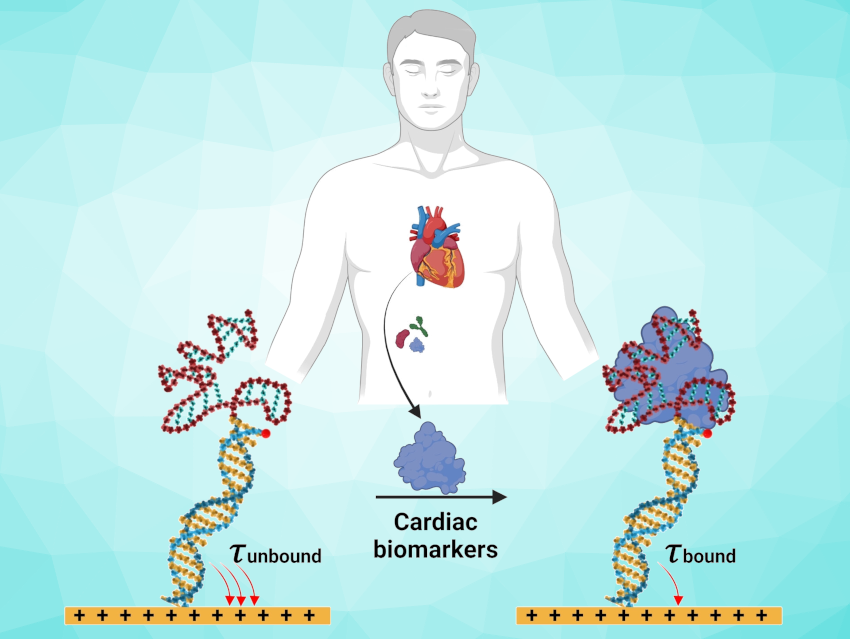Shana O. Kelley, University of Toronto, ON, Canada, Northwestern University, Evanston, IL, USA, and Chan Zuckerberg Biohub Chicago, IL, USA, and colleagues have developed an electronic biosensor based on DNA aptamers that can detect biomarkers in whole blood samples without the addition of reagents. As the team explains, the DNA aptamers recognize marker proteins as efficiently as antibodies do, but are easier to prepare and more adaptable. The biosensor was able to detect clinically relevant levels of a marker protein for cardiovascular disease without any further sample preparation.
“Molecular Pendulums”
Researchers aim to develop diagnostic tools that can detect disease biomarkers directly, reliably, and in the field, without the need to send samples to specialized laboratories for analysis. The team developed a simple chip-based device to detect marker proteins in complex samples using chronoamperometric measurements.
Their nanoscale sensor system works as a molecular “pendulum”: It measures the extra load a protein places on the pendulum, which consists of a strand of DNA tethered to an electrode. The approach does not require any external reagents.
Aptamers Instead of Antibodies
Typically, antibodies are used to seek out and bind marker proteins in complex mixtures. However, antibodies are themselves proteins, and as such are quite complex to design and produce. The researchers have found that the smaller and simpler DNA aptamers can be used instead of antibodies. DNA aptamers are short synthetic fragments with specific shapes and structures. They are relatively easy to make and, with customizable structures, cheaper to produce than antibodies.
Like antibodies, DNA aptamers can bind marker proteins through molecular and structural interactions, but they are easier to design. “DNA has the most predictable and programmable interactions of any natural or synthetic molecule,” explain Kelley and her team.
Monitoring Cardiac Biomarkers
To develop an aptamer-based sensor, the team created a DNA aptamer that specifically detects B-type natriuretic peptide (BNP), a biomarker for cardiovascular disease, and linked this aptamer with the DNA pendulum strand tethered to the gold electrode to create the molecular pendulum sensor.
The completed biosensor successfully detected BNP, even in complex mixtures such as unprocessed whole blood from cardiac patients. Because the team found that the sensitivity of the aptamer-based system was as high as that of antibody-based detection, they suggest further research and use of DNA aptamers for laboratory-independent diagnostics.
- Monitoring Cardiac Biomarkers with Aptamer‐Based Molecular Pendulum Sensors,
Alam Mahmud, Dingran Chang, Jagotamoy Das, Surath Gomis, Farid Foroutan, Jenise B. Chen, Laxman Pandey, Connor D. Flynn, Hanie Yousefi, Armin Geraili, Heather J. Ross, Edward H. Sargent, Shana O. Kelley,
Angew. Chem. Int. Ed. 2023.
https://doi.org/10.1002/anie.202213567



